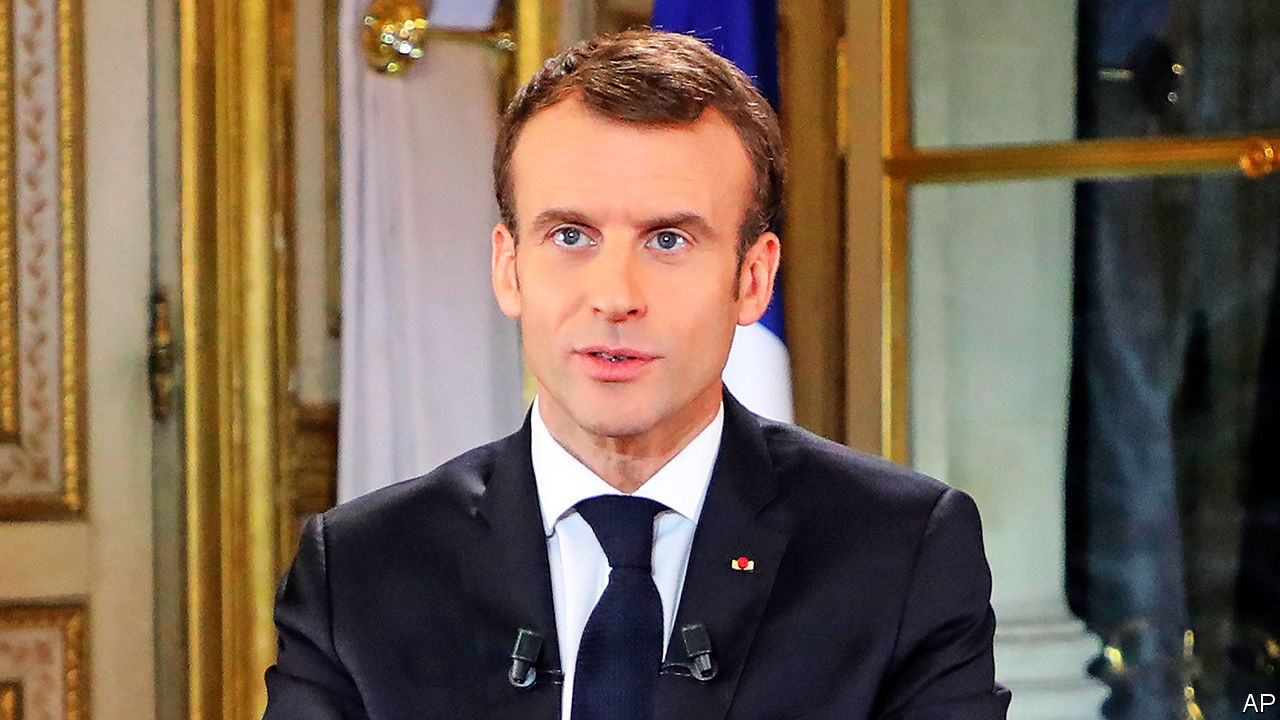
WHAT SORT of leader surrenders to the crowd? Any French president of the modern era, you might reply. On December 10th a queasy-looking Emmanuel Macron joined the long list of presidents who have been thrown off course by street protests. Hoping to placate the mob, he promised to increase the take-home pay of minimum-wage earners by 8%, to let workers get overtime pay and Christmas bonuses tax-free and to revoke higher social charges on modest pensions. That was his second U-turn in less than a week. On December 6th the government had cancelled the rise in fuel duty that had provoked the gilets jaunes (yellow jacket) protests. The direct cost of Mr Macron’s climb-down is about €10bn ($11bn), or around 0.4% of GDP a year. This threatens to send the French budget deficit crashing through the Maastricht limit of 3%, further setting back French hopes for deepening the euro zone. Mr Macron’s finance minister has vowed to find cuts to offset the extra spending.
To many, Mr Macron now looks like a president who can be cowed by flying bricks and sagging polls. His ability to bring about further reform is seriously, perhaps fatally, compromised. The gilets jaunes, having scented weakness, will surely press for more. A fifth successive Saturday of protest is now promised for December 15th. In a televised address Mr Macron admitted that he had been slow to acknowledge the hardships faced by ordinary people. He might have been more persuasive had he not recorded his speech in the grandest room in the Elysée palace, sitting behind a gilded desk.
And yet, in important ways, Mr Macron held firm. He insisted that he will not reverse an early decision to scrap France’s wealth tax. This infuriates many of the protesters, who call him the “president of the rich”. But it was right. Although Mr Macron never managed to convince voters of this, taxes on the rich had been raised to ludicrous levels by his Socialist predecessor, François Hollande. The wealth tax was routinely dodged and raised little money, but it helped scare off mobile wealth-creators. Just as scrapping the tax signalled that France was open for business, a U-turn would have suggested it had once again shut its doors.
Even more important, Mr Macron gave no hint that he would delay or ditch any of his crucial labour-market overhaul (see article). Although this is not perfect, it has stripped away some of the rules that cosset workers who already have jobs but deter companies from hiring new staff. The reform caps the size of unfair-dismissal awards and curbs the power of labour unions to impose industry-wide agreements on hours, pay and overtime. Already, these changes seem to be boosting employment. If Mr Macron had backtracked, investors would have concluded that France was as unreformable as Italy.
To have a chance of enacting the rest of his agenda, Mr Macron must persuade voters that this week’s shifts in policy were not a surrender but a tactical retreat. Much of the €10bn he is giving the left-behind is in the form of a wage subsidy for low-paid workers, which boosts their incomes without eroding the incentive to work. This is a good idea; indeed, he should have done it at the start of his presidency.
Other changes will be less popular, but they are just as necessary. Mr Macron wants to simplify and curb the growth of France’s unsustainable pension system. Inevitably that will require workers to toil longer or receive smaller pensions than they had been expecting. Faster economic growth would ease the pain, and would be easier if the French state was smaller. The government spends 56% of GDP each year, one of the world’s highest shares. It also owns stakes in almost 100 firms, most of which ought to be fully privatised.
None of these reforms can be sold from behind a gilded desk. Mr Macron needs to roll up his sleeves and explain to people in plain, un-haughty terms why his plans will make France better off. If he cannot manage that, he will fail.







